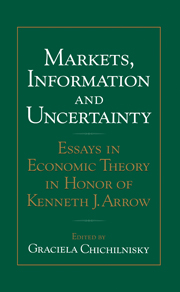Book contents
Introduction
Published online by Cambridge University Press: 05 December 2011
Summary
The mystery of brilliant productivity will always be the posing of new questions, the anticipation of new theorems that make accessible valuable results and connections. Without the creation of new viewpoints, without the statement of new aims, mathematics would soon exhaust itself in the rigor of logical proofs and begin to stagnate as its substance vanishes. Thus, mathematics has been most advanced by those who distinguished themselves by intuition rather than by rigorous proofs.
Few people fit this description. Kenneth J. Arrow is one of them. Who is Kenneth Arrow?
Although very well known, Arrow remains somewhat of a mystery. His brilliant productivity over a period of about fifteen years – from 1950 to the mid-1960s – spanned the most interesting fields in economics, bringing the power of mathematics and statistics to bear on novel approaches to economic analysis and important issues of economic policy. He left an important mark on the fields of market economics, social choice and welfare economics, the economics of uncertainty, information, and mathematical programming. After that period the fountain of innovative ideas shifted ground. The shift took him away from pathbreaking innovation and into somewhat more conventional thinking, and increased his professional ascendancy. Since the late 1960s Arrow's role as an editor and intellectual organizer has been consolidated in several books and edited volumes offering the last word on contemporary history of economic thought. The shift was somewhat surprising.
- Type
- Chapter
- Information
- Markets, Information and UncertaintyEssays in Economic Theory in Honor of Kenneth J. Arrow, pp. 3 - 18Publisher: Cambridge University PressPrint publication year: 1999
- 1
- Cited by

